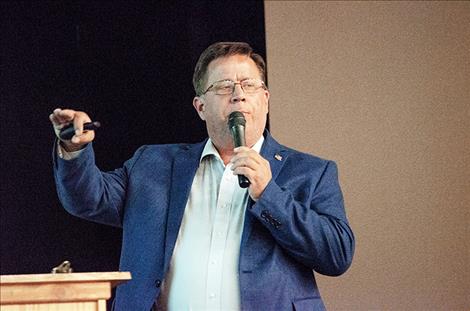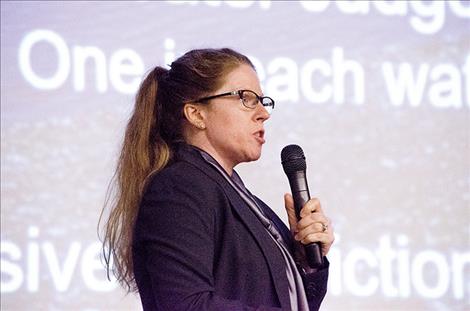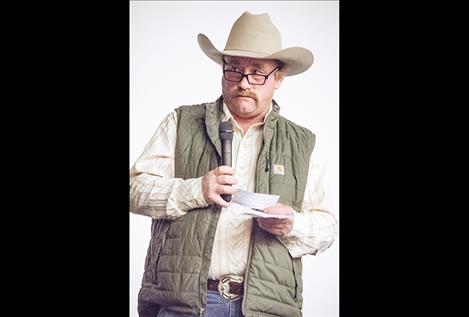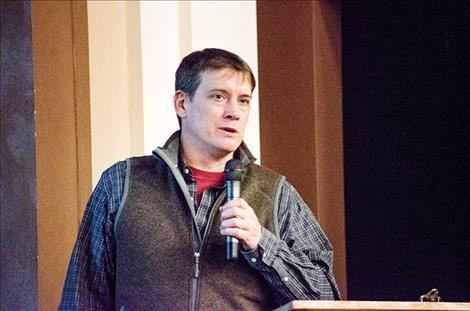Flathead Irrigation District shares water rights information
Hey savvy news reader! Thanks for choosing local.
You are now reading
1 of 3 free articles.
RONAN – As the water compact between the Confederated Salish and Kootenai Tribes and Montana sits at a standstill, the Flathead Irrigation District decided to hold an informational meeting about water issues. The Flathead District supports the CSKT-Montana Water Compact.
Paul Guenzler of the Flathead District opened the meeting by introducing three guest speakers on Wednesday, Oct. 17, at the Ronan Performing Arts Center, including Anna Stradley, senior water master for Montana Water Court; Ethan Mace, Department of Natural Resources and Conservation hydrologist; and Donnie Boyd, Klamath County, Oregon farmer. About 90 people attended the meeting.
Stradley kicked off her speech by saying Water Court was established in 1979 with exclusive jurisdiction on existing water rights in the state. More than 200,000 water right claims were filed in Montana by 1982. The claims are divided into 85 hydrologic basins. Water Court is adjudicating existing rights basin by basin.
She talked about the four ways a water right can be established in the state. The first process is done by establishing beneficial use, the second is by filing a water right, the third is done with a court decree, and the fourth is reserved for Indian tribes.
Water rights claims in the Jocko River hydrologic sub-basin (Basin 76L) and the Flathead River and Flathead Lake (Basin 76LJ) are in the adjudication process, but the judge will not rule on them yet. Water Court ordered an extended stay on the process until Jan. 10, 2020, while the CSKT-Montana Water Compact is in the legislative process in Congress. The order states that further legislative progress is unlikely until after mid-term elections this fall.
The Court is still requiring people to file claims so the process can move forward if the Compact does not pass. In the adjudication process, water right owners need to first file a statement of claim. The DNRC will examine the claims and decide if any discrepancies exist by putting issue remarks on the claims. People may get a letter about the issues. All claims need to be resolved. Water Court examines the information and issues a decree. “You’re not done yet,” Stradley said of the decree.
Other water right owners are given the opportunity to object to the decree. Water masters consolidate cases to resolve objections and issue remarks. Once those issues are resolved, the decree is enforceable. Lake County District Court is tasked with enforcing decrees in this county.
“My advice to people is to look at the decree,” Stradley said. “This is the time to do it; this is the time to participate in these claims.” She doesn’t think people need an attorney to go through the claims process unless there are issues that can’t be settled.
The DNRC water adjudication information website can be found at http://dnrc.mt.gov/divisions/water/ adjudication. The DNRC water right query system is at http://wrqs. dnrc.mt.gov.
Water compacts, instead of adjudication, are developed to handle large claims. Mace addressed the crowd and said the outcome of any litigated claim including the CSKT-Montana Water Compact is hard to predict. He said CSKT filed 10,109 claims in place of the Compact. If the Compact is approved, the claims will be dismissed. The CSKT-Montana Water Compact has 211 claims on the Flathead Indian Reservation, 10 new off-reservation rights, and a co-ownership in 87 existing instream flows, in-lake, and storage rights held by the Montana Dept. of Fish Wildlife and Parks. Mace said tribes across the state have water rights stemming from time immemorial, giving them priority.
Mace said the Compact includes state funding with $12 million for a Compact Implementation Technical Team, $13 million for habitat enhancement and protection for endangered species, and $30 million for a pump fund. He said federal funding was also allotted if it passes, and CSKT is providing funding for a water measurement program.
Water rights for wells on the Reservation have also been suspended since August of 1999 when CSKT filed for groundwater rights. About 1,800 claims are in limbo across the reservation. Mace said the Compact includes a pathway for getting those wells approved.
Mace said there are a lot of “uncertainties” with the adjudication process. He said a few things are also uncertain with the Compact but those uncertainties are much less.
Boyd took his turn on the stage and said people shouldn’t take the Endangered Species Act lightly. The CSKT-Montana Water Compact has ESA compliance terms. He spoke to the crowd in a booming voice saying farmers using water in the Klamath Basin in 1991 had their water turned off in an effort to provide more water for the endangered sucker fish.
“When they turn your water off, things get real, real fast,” he said.
Boyd said farmers spent a lot of money on litigation to fight the water shutoff, some lost their farms, friends were fighting and some farmers died by suicide when they couldn’t pay their bills. He said farmers got together and held a tractor rally and protested. Another time they jumped a fence barricading the headgate and turned the water back on, but it didn’t last long. Federal Marshalls were there to make sure the water was turned off. He went on to say that the farmers in his county had an agreement with the state similar to the CSKT-Montana Compact.
“Basically, I’m here to tell you that I’ve fought to try and save water, and we are no better off,” he said. “We are worse off. I truly believe we’d be a lot better off if we had settled instead of fight it. It was fun to climb the fence (and turn the water on), but that didn’t get us anywhere.”



















